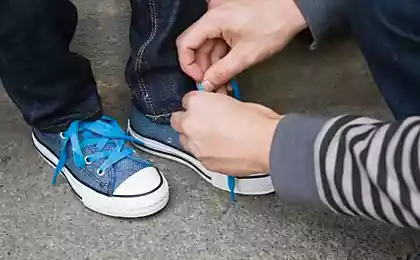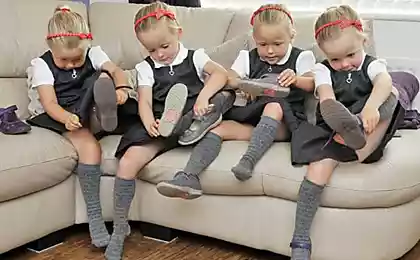971
8 problem child at school: says family psychologist Catherine Burmistrov
How to create a correct perception of the child's learning process? How to prepare homework? As problems with the lessons could damage relations between the child and the parents? All these questions are often heard in the consultations psychologist and mother of many children Burmistrova. < Website publish her wonderful article answers many pressing issues of concern to parents.

Preparation homework h3> Basic practice during our growing up has been the same: "You yourself make lessons and if you will have difficulty - you ask me and I'll help you. " Now, the whole system of education in primary schools is designed for what parents should do the lessons with the child.
To the child was active, need a change of activities, recess: ran into the kitchen with you squeezed juice and drank it; I smeared a sandwich; five times ran around the table; I did some exercises - switched.
But workplace child - not in the kitchen. It should be a certain place, and the kitchen can come to "the break." We need to teach students include workplace in order. Good ecology training places - a very important thing. There should be a place for toys, a place to sleep and a place to practice, you can even arrange to 4 years.
Do you agree in advance that if the child will make the lessons in the allotted time, then you will have time to many things: read a book, play a board game, porisuete something fashioned look favorite movie, take a walk - anything you like. The child should be interesting and profitable to make the lessons during this time.
time doing lessons - preferably before it gets dark. After school holidays. Do not leave the lessons after the circles until you build up a skill. To keep up on extra classes (pool, dance), you need to learn to do their homework quickly and efficiently. If you do, it will not stretch for the rest of the day.
If unlimited evening and the lessons you can do to hang up, then the "donkey", he stood up, rested, nothing good waiting, do not scold much - you can not do. Children usually reflected that you can not spend all day on this boring mission, but there is something else in life. It is important that life does not end going to the school: the first part of the day - a class, and the second - the lessons to night, and the child used to, that's all spread out like semolina on a plate, and think of nothing else can. Usually, time limits, and the good effects work perfectly.
The final consequences should be replaced periodically: board games replace hearing tales or something else pleasant. The schedule of the day are first learned and then - free time, t. E. Begins its life, and its lessons from the mix is not necessary.
lessons with enthusiasm? h2> What is - homework? Continuing what has been at the school or a separate case at home?

From unmade lessons to conflict in the family h2>
Preparation homework h3> Basic practice during our growing up has been the same: "You yourself make lessons and if you will have difficulty - you ask me and I'll help you. " Now, the whole system of education in primary schools is designed for what parents should do the lessons with the child.
And then there is a dilemma: how to make sure that the child successfully mastered the curriculum, though:
- Very much changed the program - even in Russian, math and reading.
- changed greatly initial level of knowledge of children of first-graders - many schools are waiting for the children already know how to read. < The teaching of a foreign language begins with the 1-2 class, the programs are designed that their child will learn to help an adult, but most of us started learning the language with the 4-5 class.
- In Russia, sharply increased the number of non-working mothers, who are willing to devote all his time to the child, which was a schoolboy, bringing down the level of independence of children. Nobody goes with the key around his neck and warms himself lunch.
- uncomfortable for parents, as make them directly responsible for the success of the children's learning.
- In the long term is very adversely affect the relationship between parents and children.
- Decrease autonomy in primary school slows willful maturation of children, reduces the motivation to learn until the complete unwillingness to learn, and it is impossible to do it on their own - without parental prodding and seating mother next. Who is the first parent-teacher conferences in the first grade teacher directly warn parents that they now have to learn along with the children.
Teachers, by default, assume that you are all primary school will be responsible for the quality and quantity of the preparation of homework. If earlier the task of the teacher was - to teach, but now the task of the teacher - to the task, and the task of parents (presumably) - to perform these tasks.
In a foreign language program all drawn up so that the child they basically can not do it without an adult. Roughly: "I do not understand - the fool. I explain the material, and if the child does not understand - either go to extra classes or parents explain. " < To this situation we must be prepared.
So parents need to sit down and do homework with the first-graders, second-graders, third grade, fourth grade. But now comes a very early ripening, and in 9-10 years you can watch all the symptoms of adolescence. For grades 5-6 the opportunity - to sit and do homework with your child - you have lost. This situation has become impossible, and for four years the child will get used to, that the mother is responsible for the lessons, and he take that responsibility can not and does not know how.
You can keep the cost of losing the relationship make it up to 14-15 years, until enough forces. The conflict will be delayed for several years, and the child will still not be able to answer for their jobs. In 14-15 years, the protest will have very bright - and a rupture of relations.
There are indicators that children who were almost honors in elementary school, because for them did everything mom and dad in high school dramatically reduces the study, because help is to take not ready, and the ability and skills to learn - not.
This system imposed a number of primary school teachers - that the child is doing at home is perfect, that is, with the help of parents.
If a child falls behind, the teacher can show the parents claim: nedosmatrivaete! Only old experienced teachers adhere to the classical system - that the child did everything himself, even with errors, and are ready to teach and correct.
«How are we doing?» h2>
The formation of proper training stereotype h3>

It is necessary to understand how a teacher you have to deal with what his position is. and, depending on the hardness of this position, bend the line of independence.
The most important thing, so you can teach a child in elementary school - a responsibility, ability to work and the possibility to take the job as your.
First, if you are moving in line with the formation of independent study, you will be lower academic performance. Particularly acute lack of independence have formed the only children in the family, and here you need to be especially careful.
The child writes his first hook - and immediately subjected to pressure parents: "Do not be led to the handle! You're kidding over us! You'll be a janitor! ". The level of motivation of the child low - level of motivation among parents rolls.
A school teacher says, "Why is the child does not come out the connection of letters?". Do not you come to the teacher, and it makes you learn with your child. After explaining the material in school, it assumes that you'll be doing on a regular basis and advise what to do. And form stable lexical bunch of "How are we doing?", Talking about the continuing symbiosis of mother and child. Then, in class 9, the child says, "I do not know who I want to be," - he has not had the feeling of being in school.
If the child is at all times to insure he did not learn how to do something on their own, he knows that "mom think of something," that in any situation parents find a way out.
But parents often fear there: «Do not pour out to teach to the child's self-sufficiency in the confrontation with the teacher, with the system?»
First may be the backlog, but then the child succeeds. There is a loss of the original, but there is this loss of 4-5 class. If during this period of excellent performance artificial falls sharply, the academic performance of these children increases dramatically.
There are children who still need help. These children are chronically scattered, the child "is not here" in their thoughts (although within the normal range).
These children need to help a little more. If the child has, in principle, have the ability to self-organization, they need to include. The issue with the lessons very simple: either he would take responsibility for them, or not take.
The picture is quite early, even with the "training." It is best to create conditions for the emergence of self-reliance, and the need to build the right educational stereotype associated with the lessons.
School characters h2>
When many teachers h3> The child is easier to get used to one teacher, who is a few items. If the teachers are different, you need to help your child find their way, "the name of any aunt." Aunts are different, they have a middle name, patronymic and first-graders to understand difficult - it is difficult to remember, hard to say.
There may be need some kind of home training: cutouts aunt-so - it is mathematics, her name is-so.
It should also help the child to learn the names of classmates. As long as the child does not know the name of classmates and teachers, he feels uncomfortable.
Focusing on the child's ability to help remember "school of characters" - children and adults - it is an important task of the parent.
Daily care h2>
school children to help organize the process of education h3> If you have a family there are children's chores, if you have at least some semblance of the regime or the rhythm of life, there kakaya- the daily chain of events that repeats (about the same time stand up, lie down at the same time) - the child will be easier to get used to the rhythm of the school.
Domestic duties are trained to take on daily responsibilities. And there are very good flowers and pets, taking out the trash - something that should be done regularly. Flowers visibly wither, cats meow and ask for a drink and a trash can not be used. Adults should not "save" a child and did not perform the duties instead.
At the time of entering the school the child should have regular duties, he does daily
schoolboy useful:
himself to be able to pack up for classes in sections and fold the bag. It is necessary to begin to do the year before school - at least. In boys, it is generally fared worse than girls. At first, the child will do it with your help, with a prompt sequence. As long as a child can not read, you can hang on a wall painted a list of what should be in the portfolio. If the child has forgotten something, do not necessarily need to correct him: let it once would be missing from the subject, but will be able to remember it. If you know that the child will still forget something at home, it is possible to check list Know where lies the clothing and footwear for school. It must assess the clothes clean or dirty, dirty clean to dirty laundry. Here, too, responsibility is generated: no big deal, see your clothes for stains. «Kids Time Management»: is not just to bring the portfolio, but also to come to class on time. This is a basic skill, without which the start of school is very difficult. To form this skill, which will stupenechkoy to the next, should also not one class, and the year before it, when the class is quite relaxed and not in the morning. Know which days there is any training. To do this, use a well-calendars. You can write a day, which in this day class, paint them in different colors, so that the child knew what to collect. If you do not have time to give your child all of these skills to school, do the same thing in one class.
How to make the lessons h2>
School Time Management h3> In order to do homework, to be a certain time. It should be full-time schedule: wake up, wash, dress - canvas days and the allotted time - do your homework.
Child easier when all rhythmically. There is a dynamic stereotype (according to Pavlov) - reaction system at a time: a child is preparing to advance to the next step.
Such a system is simpler for approximately 85% of children who are classified as "rhythmic". There are 15% bezritmovyh with chaotic time dispensation. They can be seen from infancy, so they remain in school.
After school should be an hour of rest (this rule should be observed), and then can occur the lessons
A child can show schedule dads, mums in a weekly journal, diary, and then write his schedule, to explain what happens in people, and it is - an attribute of adulthood. All attribute of adulthood - all preferably.
One of the diseases of our time - lessons spread over an inordinate amount of time. This means that people do not do simple actions to help yourself and your child, and.
You have to know that the child does not feel time. 6-7 year old child being so, as adults, do not feel, he does not know how much time passed. The longer a child is sitting at the lessons, the lower his efficiency. Norma doing lessons for first-graders: 40 minutes - 1 hour;
Grade 2 - 1 hour - 1, 5 hours;
Grade 3-4 - 1 5 - 2 hours (not 5:00);
5-6 to the class of this rule goes to 2-3 hours.
but more than 3, 5 hours is not to be spent on lessons.
If a child does his homework for longer, it is not taught to work, or he - chronic "brake", and they especially need to learn to work well. The child does not feel the time, and parents should help him time to feel.
Adequate time doing lessons for first-graders - 20-25 minutes for podgotovishki even less - about 15 minutes, for children exhaustible - maybe even less.
But if you're a child seated on time more than you need, you're just wasting your time - and his own, and his. With lessons, you can not help, but with the "time management" still stands.
In order to feel the moment, there are different ways to help the child. For example, various kinds of timers:
- may be the hourglass (not suitable for dreamers - dreamers will look like pours sand);
- may be electronic devices that will beep after a certain time;
To the child was active, need a change of activities, recess: ran into the kitchen with you squeezed juice and drank it; I smeared a sandwich; five times ran around the table; I did some exercises - switched.
But workplace child - not in the kitchen. It should be a certain place, and the kitchen can come to "the break." We need to teach students include workplace in order. Good ecology training places - a very important thing. There should be a place for toys, a place to sleep and a place to practice, you can even arrange to 4 years.
Do you agree in advance that if the child will make the lessons in the allotted time, then you will have time to many things: read a book, play a board game, porisuete something fashioned look favorite movie, take a walk - anything you like. The child should be interesting and profitable to make the lessons during this time.
time doing lessons - preferably before it gets dark. After school holidays. Do not leave the lessons after the circles until you build up a skill. To keep up on extra classes (pool, dance), you need to learn to do their homework quickly and efficiently. If you do, it will not stretch for the rest of the day.
If unlimited evening and the lessons you can do to hang up, then the "donkey", he stood up, rested, nothing good waiting, do not scold much - you can not do. Children usually reflected that you can not spend all day on this boring mission, but there is something else in life. It is important that life does not end going to the school: the first part of the day - a class, and the second - the lessons to night, and the child used to, that's all spread out like semolina on a plate, and think of nothing else can. Usually, time limits, and the good effects work perfectly.
The final consequences should be replaced periodically: board games replace hearing tales or something else pleasant. The schedule of the day are first learned and then - free time, t. E. Begins its life, and its lessons from the mix is not necessary.























